- Home
- Nancy Pickard
Confession
Confession Read online
LOOK FOR ALL OF
NANCY PICKARD’S
POPULAR JENNY CAIN MYSTERIES
GENEROUS DEATH
SAY NO TO MURDER
NO BODY
MARRIAGE IS MURDER
DEAD CRAZY
BUM STEER
I.O.U.
BUT I WOULDN’T WANT TO
DIE THERE
CONFESSION
Available from Pocket Books
and
TWILIGHT
Available in
Hardcover from Pocket Books
The Critics Love Nancy Pickard and
CONFESSION
“Another winner … Nancy Pickard knows how to weave the fabric of a mystery…. Both new and regular readers will find themselves excitedly lost in the twisting labyrinths of CONFESSION and will be waiting with anticipation for her next Jenny Cain novel.”
—Lynette E. Ingram, BookPage
“Nancy Pickard is acclaimed as one of today’s best mystery writers. Mounting evidence suggests that this description is too limited…. Pickard [is] one of today’s best writers, period.”
—Robert Wade, San Diego Union
“PIckard’s two strong suits are a richly textured style and a vivid cast of characters that includes, in this case, a family of religious zealots far more believably scary than most fictional villains. Tough, smart (but not omniscient), and loving, Jenny is the kind of heroine who has you pulling for her from the first page.”
—Tony Gibbs,Santa Barbara News-Press
“Intriguing … nerve-wracking … Readers who like to outsleuth the protagonist are going to be seriously challenged…. The author’s compassion tempers the dark side of this tale.”
—Mary C. Trone, Minneapolis Star-Tribune
A Mystery Guild Main Selection
“In CONFESSION, Nancy Pickard has once again layered a mystery that can only be solved by sifting through the lives and personalities of the complex characters in Jenny Cain’s world.”
—Barbara Burnett Smith, Mostly Murder
“A compelling story … Nancy Pickard is one of the better contemporary writers of mystery, and Jenny Cain one of the most appealing fictional detectives.”
—Anne Price, Baton Rouge Advocate
“Fans of this outstanding series are going to love CONFESSION. The story line of the double slaying is fascinating. Equally intriguing is the handling of Jenny’s search for her true feelings toward her own husband and her relationship with him.”
—Toby Bromberg, Romantic Times
“If the Jenny Cain series is simply the best, then CONFESSION may just be the best of the best. Read it, live it, love it. Trust me.”
—Laura Conn, Puget Sound Romance Readers
“CONFESSION is unlike anything else Miss Pickard has written, and it is her best effort to date. It is full of warmth and sensuality and explores the ideas of love and friendship with depth and understanding.”
—Judith Kreiner, Washington Times
“Nancy Pickard’s considerable writing strengths are omnipresent in this novel. She tells her story with a brisk pace complemented by her literate prose and her subtle wit…. Readers will surely feel many moments of terror as her story evolves. Here again Nancy Pickard gives ample proof why she is on most everyone’s shortlist of top-notch writers.”
—Don Sandstrom, Mystery News
“Universally considered a mystery master, this prolific author can be counted on to produce quality.”
—Neil McGaughey, Jackson Clarion-Ledger (MS)
“Shocking revelations abound as the old case is reshaped, a new killing must be solved, and Jenny and Geof’s union is tested to the max in a freshly plotted, psychologically intriguing story.”
—Kirkus Reviews
“Nancy Pickard continues—along with Sara Paretsky and Sue Grafton—to deliver the best….”
—John B. Clutterbuck, Houston Chronicle
Books by Nancy Pickard
Confession
I.O.U.
Bum Steer
Dead Crazy
Marriage Is Murder
No Body
Say No to Murder
Generous Death
But I Wouldn’t Want to Die There
Published by POCKET BOOKS
For orders other than by individual consumers, Pocket Books grants a discount on the purchase of 10 or more copies of single titles for special markets or premium use. For further details, please write to the Vice-President of Special Markets, Pocket Books, 1230 Avenue of the Americas, New York, NY 10020.
For information on how individual consumers can place orders, please write to Mail Order Department, Paramount Publishing, 200 Old Tappan Road, Old Tappan, NJ 07675.
CONFESSION
A JENNY CAIN MYSTERY
NANCY
PICKARD
POCKET STAR BOOKS
New York London Toronto Sydney Tokyo Singapore
The sale of this book without its cover is unauthorized. If you purchased this book without a cover, you should be aware that it was reported to the publisher as “unsold and destroyed.” Neither the author nor the publisher has received payment for the sale of this “stripped book.”
This book is a work of fiction. Names, characters, places and incidents are products of the author’s imagination or are used fictitiously. Any resemblance to actual events or locales or persons, living or dead, is entirely coincidental.
A Pocket Star Book published by
POCKET BOOKS, a division of Simon & Schuster Inc.
1230 Avenue of the Americas, New York, NY 10020
Copyright ©1994 by Nancy J. Pickard Trust
All rights reserved, including the right to reproduce this book or portions thereof in any form whatsoever. For information address Pocket Books, 1230 Avenue of the Americas, New York, NY 10020
www.SimonandSchuster.com
ISBN: 0-671-78262-2
eISBN: 978-1-451-60288-3
First Pocket Books paperback printing September 1995
10 9 8 7 6 5 4 3 2 1
POCKET and colophon are registered trademarks of Simon & Schuster Inc.
Cover design and art by William Sloan / Three
Printed in the U.S.A.
This novel is dedicated to Meredith Bernstein,
my agent and friend from the first word.
I confess my heartfelt appreciation to Loretta Loftus, M.D., and to my “readers,” including Sally, Janice, Julie, Trish, Carolyn, and Kay. I confess to being passionately grateful to my editor, Linda Marrow; to my son for being so understanding about life with a writer-mom; and to Richard.
CONFESSION
1
I STILL HAVE FANTASIES ABOUT THE DAY when fate came riding up to our house like “The Highwayman” in the old poem: “Riding, riding, riding, up to the old inn door…”
Only in this case, on this particular Sunday in that specific August, it wasn’t an inn that he came riding up to, and he wasn’t a man yet, and I wasn’t an innkeeper’s black-haired daughter. It was our home, and he was just a boy, and I was a policeman’s wife.
Even so, the refrain is inescapable: “… the highwayman came riding…”
In some of my fantasies of that day I get a chance to cheat fate: I get to spy fate as it speeds down the highway toward us as determinedly as a meteor slamming toward earth. I get time to glimpse it in the dayscape, to puzzle, half amused, only half paying attention—“What can this unexpected, rapid, unfamiliar phenomenon be?”—and then to register both thrill and horror as I slowly recognize it as something aberrant from another space and time. I get time to react melodramatically with alarm, to widen my eyes and to gasp, to drop everything and to run and slam the door in fate’s face, and to yell, “No, you can’t come in!” As if I could stop a
meteor from falling or deflect it from its path; a million people meditating all at once could do it, maybe, or one really effective yogi, but not me, not on that day,not with all I didn’t know then. It unnerves and intrigues me, this particular fantasy does, because it suggests that maybe I still don’t understand the far-reaching eon-changing power and consequence of meteors—those dinosaur-killing, fate-dealing messengers of absolute change. It hints that I wish that my husband and I could go back to the time before everything shape-shifted, an ignoble wish.
And we can’t; it was already too late for that, many years ago.
In the fantasies, I see myself as I was that day, watering houseplants. Tending. Mothering. (Everything in this word is, I’m convinced, symbolic, a lot of it’s ironic, but not everything is real, and that’s the saving grace.) Caring. Feeling happy and lighthearted in my serious way. Absorbed in not looking up to notice what’s going on around me, which doesn’t at all keep it from happening. The heat of late-afternoon summer sunshine is pouring in the west windows of our cabin/home because we hate to turn on the air-conditioning until the temperature gets unbearable; we’re always trying to convince ourselves that we feel a cool watery breeze off the Atlantic Ocean, which is only a few hundred yards away, down a steep and rocky hillside to the east of our front door. From that door, a gravel drive circles out into a dirt road that winds through a tunnel of tall, old overgrown evergreen and locust trees to the state highway, which in turn leads to a short stretch of interstate, which quickly cuts back toward the ocean and then toward our hometown, which is Port Frederick, Mass.
So it’s hot in the house in my fantasies and as it really was that day. I’m moving slowly, languidly, like a goldfish swimming at the surface of a warm pool. Like the fish, I feel gold all over, in the sunlight, yellow hair, summer tan, yellow shorts. I feel molten, melted, lazy, I feel like lying down and taking a nap and then waking up and making warm slow love to my husband. In my fantasy I think of putting down my watering can—it’s baby blue, plastic, with a long thin spout like an anteater’s nose, a piece of tough, touchable reality—and of going to find my husband, of wisping my fingers over the skin of his bare tanned shoulders, of touching my lips to the sweet skein of sunlightened brown hair below his neck bones. In one version of my fantasies, I do that, and we go upstairs to our bedroom to make love and so we don’t even hear the doorbell ring. We’re busy. Fate gets discouraged, changes its mind, goes away forever.
I have very real-seeming fantasies.
It still smells like breakfast bacon in the house on that particular Sunday in August in reality and in my imagination; the heat has caught that greasy rich smell in its humid fist and has refused to let it go even hours later into the day. Into this moist, hot scene the doorbell rings, annoying me as if it were a sudden fly in my face, making me want to bat it away, to shoo away whatever pest it is who is intruding on our August idyll. I look up and when I do my hand jerks, causing a little cascade of water to slosh out of the can and to drench a spot the size of a man’s palm print on the rag rug at my bare feet. My toes get wet. That, at least, feels good.
“Damn,” I exclaim.
The damn’s partly for the spill and partly because I don’t want visitors. It’s been a lovely, quiet, communing sort of Sunday. My husband and I have slept late. We’ve read snippets of newspapers to each other—the Port Frederick Times, the Boston Globe, and the New York Times. We’ve emptied two pots of coffee, abandoned our breakfast mess on the counters and the table in the kitchen, piddled about, mending this, watering that, making jokes, touching, smiling, kissing as we pass in the halls, the bedroom, the living room, the kitchen, moving slowly. It’s just us, just as it has always been since we met, then moved in together, and then finally married. No dog, no cat, no parakeet. Only the two of us, still young enough to have children, but also still arguing about the necessity, the probability, the wisdom of it. He wants; I don’t. I waver; he presses. I capitulate; he changes his mind, because he doesn’t believe I really want to. He wants; I don’t again. The upshot being: We haven’t And so we remain two, very two, blending, merging, weaving our separate egos into a strand of long, long twine, the kind whose threads are so inextricably connected you cannot easily pick them apart, not even with your fingernails or even by sticking a pin between them and trying to lift them apart from each other. He remains exceedingly who he is: Geoffrey Bushfield, thirty-nine years old (but soon to be impressively older), police lieutenant, native of our town. I remain absolutely who I am: Jennifer Lynn Cain, thirty-six years old (on that day), do-gooder, optimist, native. But who we are is altered by the presence of the other, our molecules rearranged to accommodate each other’s DNA, so that it feels as if I form one-half of that strand and he is the other, twisting upward, tighter, closer, as if we could adhere so fast to one another there would be no room for error, for surprise, for fate. We were Siamese twins, he claimed, separated at birth. We were attached by Velero, I said, and I pointed to an imaginary strip of the fastener at my side or his. Increasingly, in his absence, I felt an ache at my side, where the tiny plastic hooks in the Velero reached for connection with him.
“Damn,” I repeat, and then I call out, “Can you get that?”
No answer. Where is he? Out back? Oh, right, he’s in the basement.
The rug will absorb the spilled water, so I don’t hurry to clean it up but simply set down the can on the floor, thinking, This is not a good idea, I am going to forget it’s there and trip over it, or Geof will. But there’s somebody at the door, damn it all, and I don’t want to carry the can back to the kitchen.
Ring. Again. In my fantasies, the second ring of the doorbell takes on personality, intent. It’s aggressive. RING. It’s demanding. ANSWER ME! It makes my heart beat unaccountably hard and fast, it causes me to pick up the speed with which my bare feet walk to respond to it. It makes me tuck my braless, sleeveless, scoop-neck T-shirt into my shorts and to tug with my hands at my hems to pull them down into modesty. It makes me alert, like a rabbit in our front yard where neighbors’ dogs and strays come nosing around.
I approach the front door.
I stare. Stop. I have a chance to comprehend that our lives will never from this moment ever be the same again, like getting an opportunity to say good-bye to someone you love just before she dies. There’s even time in this fantasy for me to take a deep breath and to pause for a bittersweet moment to savor the slow revolving of our histories to this instant. And then I pivot and face the back of the house.
“Honey?” I yell in my fantasy. “Fate’s here!”
It was male, fate was, and looked about sixteen or seventeen years old. It wore black and white running shoes; white socks; blue jeans; a long-sleeved, button-down white dress shirt with the sleeves rolled up at the elbows and no T-shirt underneath; and a black baseball cap with a Star Trek logo above its bill. It looked rumpled, fate did, and sweaty, but basically clean, as if it had bathed recently and then had thrown on any old clothes that happened to be lying around on the floor of its bathroom. They looked clean, too, just unironed. But then, does fate iron? It’s more likely, I think, that fate irons things out or throws irons in the fire or removes one’s irons from the fire or tosses iron-y about like confetti. Confetti. Now that makes me think of parties. Celebrations. Welcomings. Farewells. Fate’s irony, a strand of confetti: We could, I guess, call this astonishing happening on that day a birthday party, but not Geof’s, even though his fortieth was only a few weeks away, and not mine. No, we’d have to call it fate’s belated birthday—the fate who arrived in a wrinkled white shirt that looked as if his father had passed it down to him when it no longer looked good enough to wear to work, or maybe his mother had lifted it out of the ironing basket and had given it to him. Irony basket? Fate had acne, did I mention that? And didn’t you always just expect that of fate? There was an interesting face beneath the spots, I thought as I looked at him, but at the moment at which fate rang our doorbell it was still a face only a mother could lo
ve, which was a problem for the boy on our doorstep.
2
“YES? HELLO?”
I stood inside the screen door, staring up at the kid who stood on the opposite side of it staring in at me. There was a motorcycle parked in our gravel drive, an ancient and battered-looking black one that resembled a wasp: with a thorax so bleached out by the sun that it seemed tie-dyed, silver handlebars with black grips like a wasp’s bent legs, and a long silver stinger of a tailpipe. I didn’t recall hearing it buzz up to our house.
Behind the boy and the bike, the day was bright enough to hurt my eyes; it made the inside air feel newly cool, like a shadow directly under the branches of a leafy tree on a very hot day.
The kid’s baseball cap, the one with the Star Trek logo, was pulled low on his forehead, so I couldn’t see his eyes, only his long straight nose and his mouth with its lower lip that was fuller than the top one and the acne that was splattered as if an angry painter had flipped his brush at the kid’s face.
“I’m here to see Lieutenant Geoffrey Bushfield.”
He pronounced it correctly: Jeffrey. It was always a problem, Geof’s name, because most people couldn’t pronounce it when they saw it written, and he was always having to spell it for strangers. Blame it on Geof’s mother, I always told people: She had an English aunt, pretensions, and no idea her firstborn would be a cop.
The visitor lifted his chin, and now I could look up into his eyes. They were hazel, more golden than either brown or green. He was staring at the interior of our house with a look of intense curiosity. That stare and his announcement, stated in a don’t-give-me-any-shit kind of hard voice, raised the hair on my forearms as if I’d stepped under an air-conditioning vent. The day seemed to darken for a moment, and I wondered if a cloud really had passed over the sun or if the pupils of my eyes had briefly contracted in response to his words. I felt my neck muscles cord, my jaw tighten, my diaphragm contract defensively, as if to ward off a blow through the screen in the door. My lips shrank back from their tentative smile of Sunday welcome. I lived with a former homicide detective, and you just never knew.

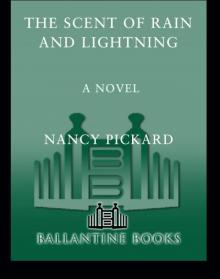 The Scent of Rain and Lightning
The Scent of Rain and Lightning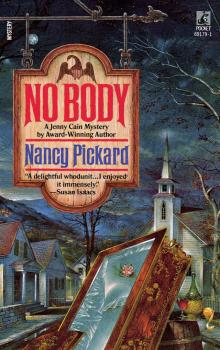 No Body
No Body The Secret Ingredient Murders: A Eugenia Potter Mystery
The Secret Ingredient Murders: A Eugenia Potter Mystery The 27-Ingredient Chili Con Carne Murders: A Eugenia Potter Mystery
The 27-Ingredient Chili Con Carne Murders: A Eugenia Potter Mystery Twilight
Twilight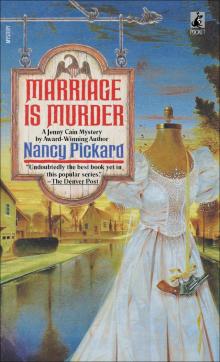 Marriage Is Murder
Marriage Is Murder I.O.U
I.O.U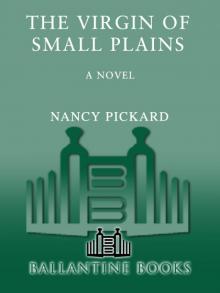 The Virgin of Small Plains
The Virgin of Small Plains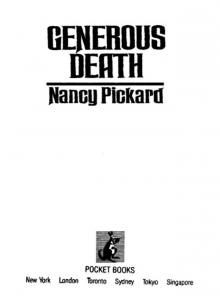 Generous Death
Generous Death The Whole Truth
The Whole Truth The Blue Corn Murders
The Blue Corn Murders Say No to Murder
Say No to Murder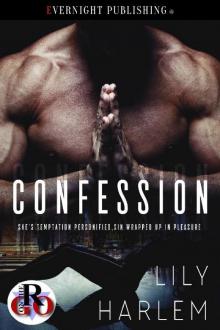 Confession
Confession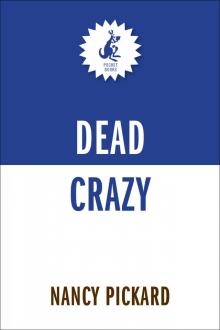 Dead Crazy
Dead Crazy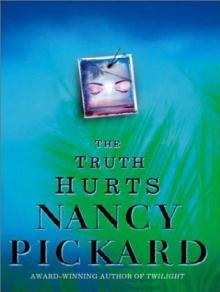 The Truth Hurts
The Truth Hurts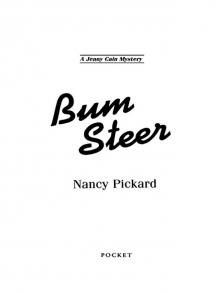 Bum Steer
Bum Steer